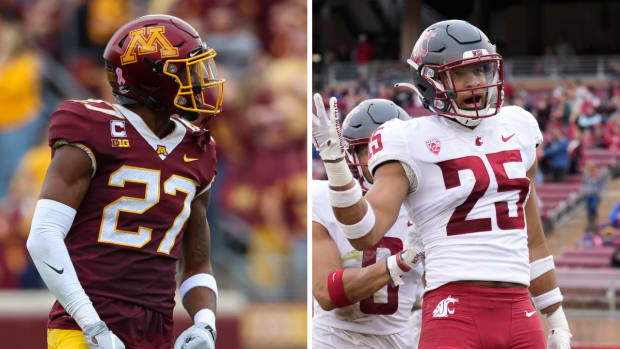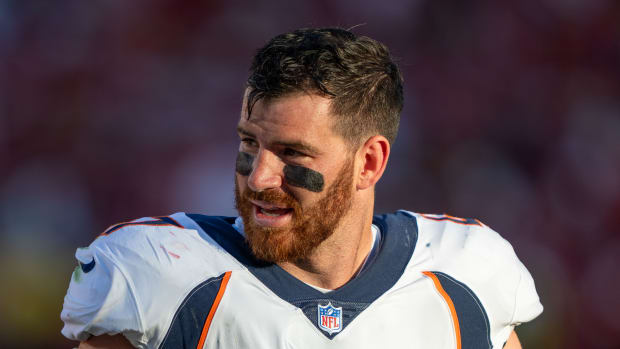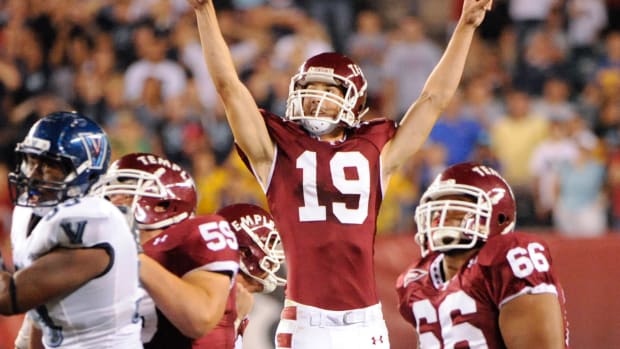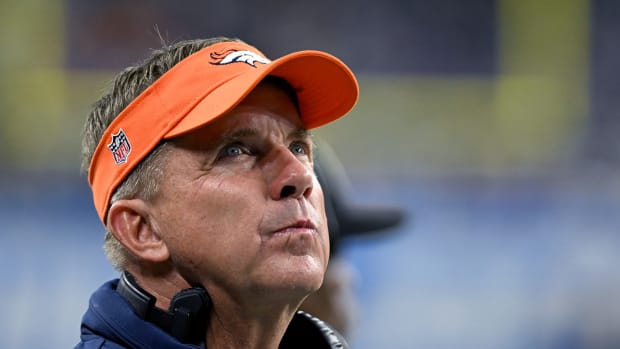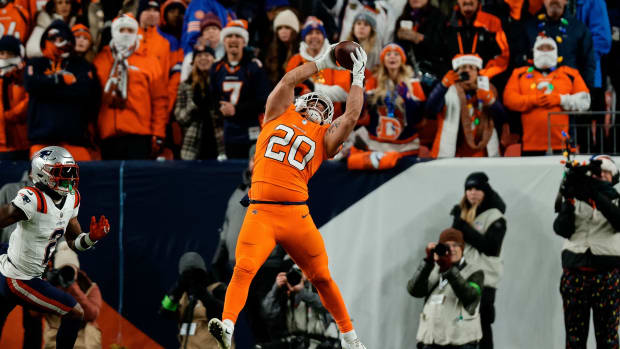Russell Wilson and the Lessons Learned from 'Broadway' Joe Namath
I’ve been looking at some stats on both Russell Wilson personally and the Seattle Seahawks in general. It’s been interesting work — I’ve long wondered why Wilson gets so little love that he’s never had a single MVP vote, even in the year he won the Super Bowl.
Granted, the MVP vote comes before the playoffs, but Seattle won the NFC Championship in both the 2013 and 2014 seasons, so there had to be at least some indication that his team was as hot as he was. And yet…
I’m not sure that Seattle — which, granted, isn’t a major media hub — focused on him enough. I’ve watched lots of Denver Broncos suffer that media malaise as well, but the larger question is, did Seattle really set him up to win?
Squandered Opportunities
I say that because Wilson had the lowest number of attempts over the past 10 years of any starting QB, but the seventh-highest sack total. The Seahawks really didn’t protect him well, year after year. That had to get old.
Marshawn Lynch would finally run out of steam, missing the 2016 season and fading after 2017. So did the team plan, ala Pete Carroll — yet it never changed.
In the Super Bowl-winning season of 2013, Seattle had the league-leading rushing attack, running back Marshawn Lynch, and a 12-4 record. But what we rarely hear is that Wilson had one of the most prolific rushing quarterback seasons ever in 2014 with a career-high 849 rushing yards and six touchdowns on the ground to go along with a league-leading 7.2 yards per attempt.
Shouldn’t that have set off at least a couple more congratulatory bells?
It’s downright strange. But the low-media city, the running game-centric offense even after Lynch retired, and the reliance on defense combined to limit Wilson's output, his pleasure in his job, and what the NFL fans and writers saw of the shorter, fast, rocket-armed quarterback.
After their Super Bowl victory in the 2013 season, the Seahawks' defense blew a series of fourth-quarter leads in early 2015. Wilson was sacked 44 times that year, yet he had a completion percentage of 68.12, 34 touchdowns, and only eight interceptions.
Wilson was exceptionally accurate and very stingy with the ball when it came to interceptions. For his career, he has 292 touchdowns and 87 interceptions, but Seattle never gave him his full use.
I was looking at the way Seattle (under)used Wilson during these past years and a similar scenario regarding QBs occurred to me. I’m talking about Broadway Joe Namath, he of the huge ego and equally large arm. But the reason that Joe comes to mind is explained by his performance in the 1969 Super Bowl.
It surprises a lot of folks to learn that Joe’s off-field behavior was the polar opposite of who he was on the field. He was extremely intelligent, conservative, and knowledgeable. Over the course of the 1969 season, his coaches swore that he never missed a coverage call.
Namath spent more time in his hotel rooms, sitting in the dark, watching old-time scouting and game film, than he ever did hitting the clubs and carrying on. It gave him an inherent edge in ways that Wilson seems to share — underrated intelligence, arm strength, confidence, and desire.
Despite the way Seattle squandered the Wilson-led fourth-quarter leads in early 2015, it was Wilson, during a career year, who led the team back to an 8-2 record to finish out the season. This punched a ticket to the playoffs, which had been preceded by Seattle winning its way to the Super Bowl for the second time in a row.
Given the right tools, scheme, and support, how can we know what such a man can do?
Despite Wilson's obvious acumen and otherworldly talent, the Seahawks doggedly stuck to the ground game for years, at first behind Lynch, and always behind the same 'Legion of Doom' defense that nearly lost them the 2015 season and did lose them the Super Bowl to the New England Patriots.
Wilson’s deep passing skills were too often squandered in favor of the defense and the run game — both good, at times excellent, but that doesn’t mean that you should ignore an additional way to torment your rivals.
Over his first 10 years in the league, Wilson had fewer throws than any other starting QB, yet ranked seventh in sacks for the same timeframe — including the 2018 season when he took 51. He was poorly protected and he was badly underutilized. The Broncos have the opportunity to fix both circumstances. If they do, well…
The Path to Broadway Joe
That leads us to Broadway Joe. Namath approached the 1969 Super Bowl with a hitherto unheard-of show of outward bravado. Later, many of his New York Jets teammates would admit that they didn’t think they stood a chance against the Indianapolis Colts, who ran a brutally effective rotating strong-side zone defense; it was the best in football.
Despite that, Namath made a series of outlandish claims: he guaranteed a New York victory, building up his team in the press and beginning to convince many of them that they really did stand a chance. How he pulled it off is a testament to what can happen when you give a smart, strong-armed QB the right players and the chance to call his own plays.
Leading up to the game, Namath had established total control of his offense. Watching film prior to the contest, he became convinced that he could take apart their rotating strong side defense.
Late in the season, the Jets' offensive line was breaking down, yet that didn’t bother Joe, who also had legendary fullback Emerson Boozer and running back Bill Mathis. Namath's top receiver was hurt, but he saw in that an opportunity; one he wouldn’t let slip away.
In those days, the strongside, or as we call it, the ‘Y’ receiver, was the flanker back, who was usually the best receiver on the team. Namath’s flanker was Don Maynard, and Don was one of the best in the business. But Namath knew that Maynard was nursing an undisclosed leg injury.
Joe also knew that the Orange Bowl turf was strong and thick, the weather was supposed to be good (it was), and that he had the skill to fire his passes into the creases of the rotating strong-side zone defense. He’d done it before, and he had no doubt that he could do it again. Doubting himself wasn’t in Joe’s makeup.
It isn’t in Wilson’s either.
In the first half, Joe went to Maynard as often as the receiver could handle. Don, bad leg and all, managed to fire off the line on one play, getting behind the rotating cornerback and safety with his speed just that once, bad leg and all, scaring the hell out of them and convincing them that it would be Maynard who Namath would go to with the game on the line.
Split end George Sauer (what we call the 'X' receiver nowadays) was Broadway Joe’s secret weapon. Sauer got the ball a few times that first half, but so did the running back, the tight end, and even fullback Boozer. Namath knew he had to convince the Colts that he was going to play the game they had come to defend.
Joe stood up to repeated blitzes in the game, completing 5-of-6 check-down passes to negate the onslaught. To Baltimore’s dismay, it was Sauer, the split end, who caught the ball 8 of the 12 times Namath flung it his way for 133 yards, setting a then-Super Bowl receiving record.
Namath put on a clinic, hitting the cracks in that defense 11-of-15 times. His 5-of-6 check-down passes solved the blitz, taking that option effectively off the table. He had thrown into the coverage areas seven times, four of them to Maynard, and completed just one — but by doing so, he disguised his intentions and set up the destruction of the best defense in the NFC. The Colts left the field stunned, disbelieving of what Namath had conned them into doing.
The Wilson Thread
Wilson has the same type of encyclopedic knowledge, battlefield commanders’ understanding of tactics, and howitzer arm, in addition to some of the best wheels in the game. Those wheels will weaken over time, but his insight, confidence, and deep passing ability won’t.
Wilson is the perfect chess piece for the long haul in Denver. The Broncos can offer him a unique stable of receivers, an offensive line that is being extensively upgraded, and a running back who seems much like a pinball, bouncing off and wheeling through would-be tacklers with an ability all his own.
Add to that a GM with Super Bowl aspirations, a revamped roster, and a defense with few weaknesses, and you have a recipe for success that is creating discomfort in the minds of head coaches and defensive coordinators all over the league.
Wilson has already shown courage under extreme fire, having suffered far too many sacks for his paltry number of attempts. He’s waited his turn, first patiently, then with growing discomfiture, irate at the attempt to let his skills go to waste. Denver has become the beneficiary of poor team planning.
Broncos GM George Paton isn’t the kind of man to let an opportunity like this go to waste. Neither is head coach Nathaniel Hackett nor offensive coordinator Justin Outten, each of whom has been waiting for a moment of their own.
Everything they learned in Green Bay, maximizing Aaron Rodgers, has gone into designing the Broncos from a revamped and greatly expanded coaching staff to a Super Bowl-winning defensive coordinator and a roster most teams dream of.
No one is more aware of the moment than Wilson, who’s seen too many sacks, too few passing attempts, and a generally acceptable but ultimately inadequate group of wideouts, along with a run-first offensive plan and a defense-first team theory that let the QB achieve less than he’s capable of.
Much as people once only saw Namath as the ‘Broadway Joe’ persona he cultivated in public, and looked past the cold-eyed grid-iron director, carefully planning the downfall of opponents that expected to defeat him in short order, Wilson feels that his former team has looked past his skillset once too often.
Wilson sought a new home, one in which he would be appreciated, protected, given a top-flight set of weapons, and set loose on the rest of the NFL. Having been given all that he desired, the only question now is how far his talent can take him.
The long-suffering fans of Broncos Country are eager to take the trip with him.
Follow Dr. Smith on Twitter @DocBearOMD.
Follow Mile High Huddle on Twitter and Facebook.
Subscribe to Mile High Huddle on YouTube for daily Broncos live-stream podcasts!



